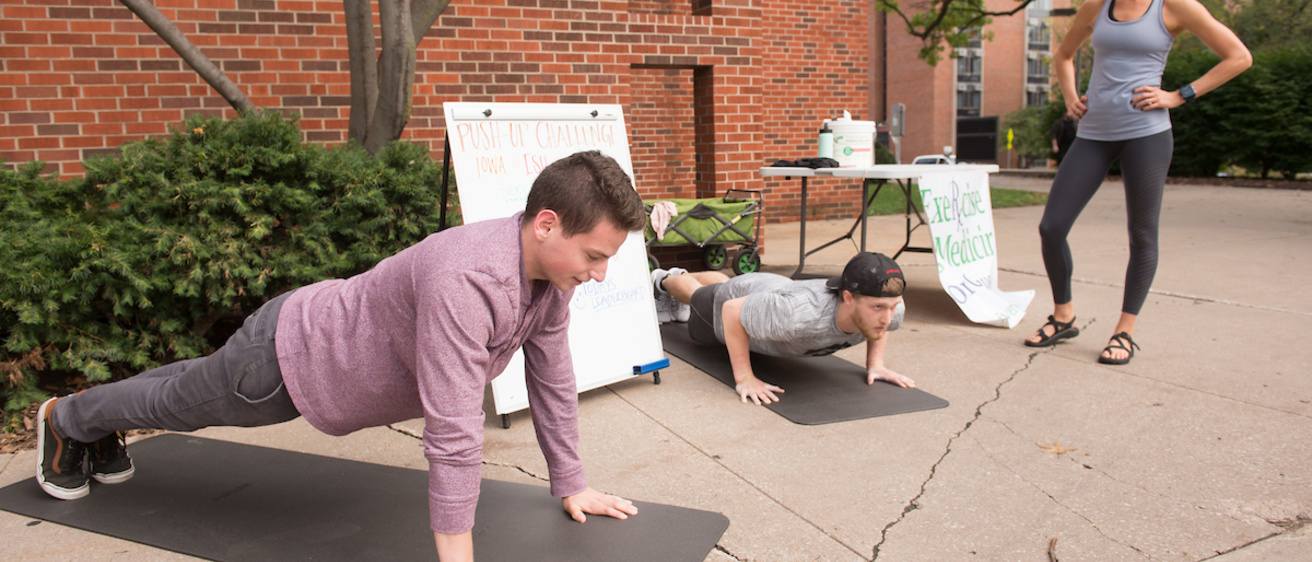In the Weight Management Clinic at University of Iowa Hospitals & Clinics, Director Helena Laroche sees patients who would benefit from exercise but don’t necessarily know how to integrate physical activity into their lives.
“They’re at a point where they really need to learn how to exercise,” says Laroche, assistant professor of internal medicine and pediatrics. “A lot of them are dealing with leg pain, foot pain, and back pain.”
Laroche says her patients work hard to make changes, and she provides them with guidance. But she’s only able to see her patients every two months—Laroche says the process needs more availability than that.
Now, thanks to a new UI partnership, Laroche and other University of Iowa health care personnel can refer their patients to a place where they can get the guidance and support they need to lead more active lives and improve their health.
The University of Iowa is an Exercise Is Medicine campus. That designation recognizes much of what the university already is doing to promote physical activity and wellness, including health coaching services, fitness classes, intramurals, access to recreation facilities, and student clubs that incorporate physical activity.
In recent weeks, the Department of Health and Human Physiology launched the Community Outreach Lab in the UI Field House and began accepting its first clients. The lab, part of a larger Exercise Is Medicine initiative, is overseen by Alison Reichter, a lecturer in health and human physiology and a certified health coach. Five student health coaches who are taking a health coaching practicum serve as lab staff.
“Our ideal client is someone who is interested in increasing their physical activity or improving their overall health and wants support to do so,” Reichter says. “Someone who needs that accountability piece and help breaking down the large goal of increasing physical activity into smaller, more manageable steps.”
The Exercise Is Medicine initiative was introduced to the UI campus this summer. Launched by the American College of Sports Medicine in 2007, the Exercise Is Medicine initiative calls for integrating physical activity into the health care setting, says Lucas Carr, associate professor in the Department of Health and Human Physiology.
Carr says under the Exercise Is Medicine initiative, health care providers treat physical activity levels as a vital sign, similar to weight or blood pressure. Using that physical activity measurement, providers can then prescribe exercise to a patient in need.
“Most physicians don’t do that,” Carr says. “Either they don’t have enough time or they don’t feel comfortable prescribing exercise. If prescribing exercise is not an option, the other option is to refer to an exercise professional in the community. That’s where we come in.”
UI faculty, staff, and students already have access to health coaching through the liveWELL program. Carr says the Community Outreach Lab is a resource for patients and members of the community who don’t attend or aren’t employed by the university. The lab currently has five patients, and Carr hopes that number will soon increase.
“There are many patients who will benefit from this,” he says. “The evidence supporting physical activity for primary and secondary prevention of chronic diseases is irrefutable.”
Carr says his goal is to form a large student organization to promote these opportunities and spread awareness across campus. This month, the Exercise Is Medicine team hosted a kickball match and pushup challenge to increase awareness of their services. They also will participate in the UI Health Fair on Nov. 7.
“One of the goals of this campus piece is to create a culture of movement,” Carr says. “It’s important to ensure all students, faculty, and staff are aware of the benefits of physical activity and have resources available to support their activity goals.”
The University of Iowa Health Fair will take place from 7:30 a.m. to 4 p.m. Nov. 7 at the UI Field House. To learn more, visit hr.uiowa.edu/livewell/health-fair or contact liveWELL@uiowa.edu.
The health fair will offer free screenings and assessments, demonstrations, flu vaccines, information about benefits enrollment, and more.
Reichter says the clinic offers an opportunity for students with an interest in health coaching to get experience working with patients. The practicum students spent the first four weeks of the fall semester learning how to meet with clients, effectively communicate with them, and help them achieve their goals. Reichter envisions the clinic offering a 10- to 12-week coaching program that would start with weekly meetings for the first month, then decrease to meeting every other week. An emphasis is placed on setting goals, with the patient taking the lead.
“One of the most beneficial aspects of health coaching is the coaches themselves aren’t setting goals—it’s the client setting their own goals with feedback from the coach,” Reichter says. “It’s a very client-centered process.”
Reichter says the lab benefits clients and students alike. In addition to earning three credit hours for the pass-fail course, students learn valuable communication skills that can be applied to health coaching or other fields. There’s also the sense of satisfaction that comes with helping others, she says.
“You feel really good when you can see yourself making an impact on other people’s lives,” Reichter says.
Moriah Stickley, a senior health and human physiology major from Urbana, Ohio, is one of the student health coaches in training. She’s excited to see her first client and put the skills she’s learned into action.
“I’m really excited to get to do that within a classroom setting,” Stickley says. “My goal is to grow as a coach. I want to take in this experience, use it to grow, and learn along the way.”
